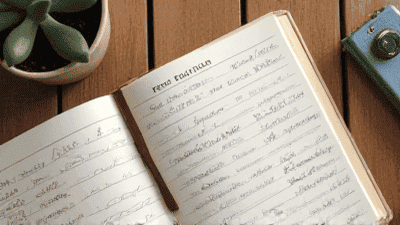
In our fast-paced world filled with constant distractions and stresses, mental health has emerged as a crucial aspect of overall well-being. Individuals are seeking effective methods to enhance their happiness and emotional stability. One potent yet often overlooked tool for achieving this is mood journaling.
At its core, mood journaling involves documenting your emotional state over time. The act of writing about your feelings can help you better understand and manage them. Unlike regular journaling, which may encompass a broad range of topics, mood journaling focuses specifically on emotions, allowing you to identify patterns, triggers, and changes over time.
Before diving into the benefits of mood journaling, it is critical to understand why recognizing and tracking emotions is important. Emotions play a vital role in our lives, influencing our decisions, relationships, and overall mental well-being. Unfortunately, many people tend to suppress or overlook their emotions, leading to unresolved feelings that manifest as stress, anxiety, and other mental health issues.
By acknowledging and tracking emotions, you:

Mood journaling encourages self-reflection, providing a safe space for exploring inner thoughts and feelings. Through introspection, you may uncover underlying beliefs or patterns that influence your mood.
Regularly documenting your emotions can help you develop strategies for coping with negative feelings. By identifying specific triggers, you can create an action plan to manage them, reducing their impact on your daily life.
The process of writing down your thoughts can provide an emotional release. By externalizing your feelings, you may experience a sense of relief, leading to reduced stress levels and a greater sense of calm.
Mood journaling encourages you to reflect on positive experiences and highlight moments of joy. This practice can foster gratitude, which has been linked to greater happiness and well-being.
Mood journaling is an excellent way to practice mindfulness. By focusing on your feelings in the moment, you cultivate awareness and acceptance, enhancing your overall emotional intelligence.
Now that we’ve explored the numerous benefits, let’s discuss how to get started with mood journaling. The process is relatively simple, and you can tailor it to fit your individual needs.
The first step in mood journaling is deciding how you want to document your emotions. Here are a few options to consider:
Establishing a consistent routine is crucial for effective mood journaling. Here are some tips for integrating it into your daily life:
Mood journaling can be as simple or as detailed as you wish. Consider the following aspects to track:
Once you have established your routine, it’s essential to dedicate time to reflect on your entries periodically. Reviewing your journal will help you identify patterns and connections:

To make the most of your mood journaling experience, consider implementing some of the following techniques:
Visual representations of your mood can enhance your understanding of emotional patterns. Create charts that track your moods over time, helping you see fluctuations and identify trends more easily.
Integrate mood journaling with other holistic self-care activities. Consider incorporating practices such as meditation, yoga, or walking in nature to further enhance emotional well-being.
Incorporate creativity into your journaling process by using art, stickers, or colored pens. Expressing emotions through different forms of media can enhance your connection to your feelings, allowing for greater insights.
Begin or end each entry with a positive affirmation. Phrases like "I am capable," or "I embrace my emotions" can boost your self-esteem and foster resilience.
Consider sharing your mood journaling journey with a supportive friend or therapist. Having someone to discuss your entries with can provide additional insights and motivation to stay consistent.
While mood journaling offers numerous benefits, you may encounter challenges along the way. Here are some common obstacles and ways to address them:
If you struggle with knowing what to write, consider using prompts to guide your entries. Examples include:
Maintaining consistency can be difficult. To address this, you might set reminders on your phone or tie journaling to an existing routine, like brushing your teeth at night.
Some individuals may hesitate to write freely due to fear of judgment. Remember that your journal is a private space meant for your eyes only. Allow yourself to express your thoughts authentically without self-censorship.
If you find yourself becoming frustrated or overwhelmed with mood journaling, take a step back. Remember that this practice is meant to support you — it is okay to take breaks or modify the process to better suit your needs.

In addition to its standalone benefits, mood journaling can complement other aspects of mental health and self-care. Consider these strategies for integrating mood journaling into your overall well-being:
Discuss your mood journaling journey with a therapist. They can help you interpret your entries, set emotional goals, and develop coping strategies.
Mood journaling can be a powerful tool for setting and tracking personal goals. Use your insights to establish realistic objectives and monitor your progress over time.
If comfortable, consider sharing your findings with trusted friends or family members. Opening up about your feelings may strengthen connections and foster understanding within your support network.
Explore online communities or forums where individuals share their mood journaling experiences. Engaging with others can provide support, motivation, and fresh perspectives on your journey.
Mood journaling serves as a powerful tool for enhancing happiness and emotional regulation. By tracking emotions, recognizing patterns, and cultivating self-awareness, individuals can take proactive steps toward a more fulfilling life. The act of journaling allows for emotional release, insight, and ultimately leads to enhanced well-being and resilience.
If you are looking to boost happiness and enhance your mental health, consider giving mood journaling a try. It’s a simple, accessible practice that can yield profound benefits over time. Remember that the journey of self-discovery and emotional growth is unique for everyone. Embrace your individual path, and allow mood journaling to guide you towards greater happiness.